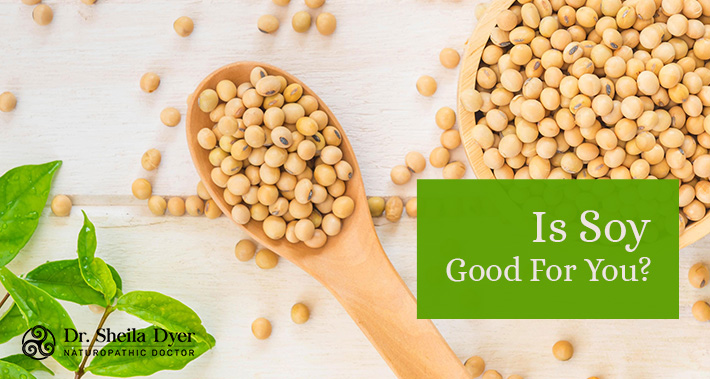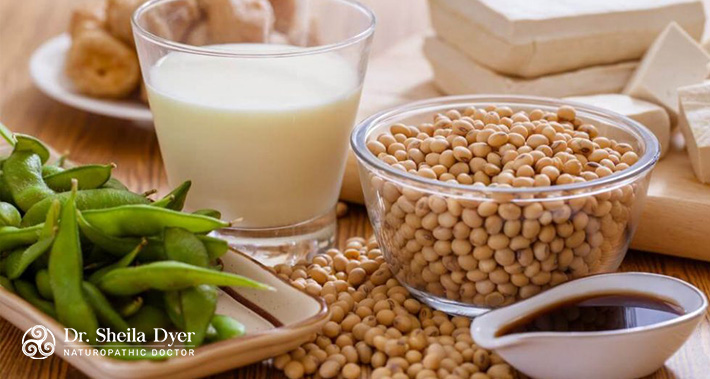Most foods aren’t very controversial.
When it comes to natural nutrition there are a few things people tend to agree on.
Barring some form of allergies, most people agree veggies are good for you, and snacks like cookies and chips are tasty but are best in moderation.
Some other foods however, don’t have such a clear answer.
There are lots of people who say avoiding meat is the best path to good health, while others incorporate it to a healthy diet.
Many people avoid gluten, even though others will say you don’t need to do so unless you have an allergy, or a digestive health issue like celiac disease.
Others still will argue that people weren’t meant to consume dairy products.
And a lot of people will state it’s best to avoid soy-based foods, however for many they’re an important source of protein.
I’m Dr. Sheila, a Toronto naturopath, and today I’m going to help de-mystify soy for you.
Keep reading for the facts about soy.
What Is Soy?
Soy is a legume which comes from Asia.
It’s been widely consumed as part of traditional Asian diets for thousands of years, although today it’s part of a number of processed foods.
Types Of Soy Products
There are a number of different ways to incorporate soy into your diet – let’s examine a few of these.
The least processed form of soy are whole soy products such as edamame (immature soybeans), as well as tofu and soy milk which are made from whole soybeans.
Edamame is often used as a high protein addition to Asian dishes, while soy milk is made by grinding whole soybeans and filtering out the solids.
Fermented soy products include tempeh, miso, and soy sauce.
Processed soy-based food includes vegetarian substitutes for meat, yogurt and cheese products.
Finally, soy protein is a common supplement used in protein powders, bars, and shakes.
Benefits Of Soy
Proponents of soy have a number of benefits to point to.
It’s full of nutrients, better for the environment than meat products, and might even help lower cholesterol levels.
Keep reading to learn more about the pros of soy.
1. It’s Nutrient-Dense
Soy-based foods are a great source of many nutrients including:
- Fibre
- Protein
- Vitamin C
- Vitamin K
- Folate
- Iron
- Magnesium
- Potassium
- Copper
- Manganese
- Zinc
- Phosphorus
In addition to these, it also has small amounts of niacin, vitamin E, and vitamin B6.
Many other soy products are fortified with extra nutrients, like calcium and vitamin D.
Soy also contains phyto-chemicals, which are believed to protect cells against cancer.
2. May Help Manage Menopause Symptoms
If you are going through menopause, part of the reason for the symptoms such as hot flashes, mood changes, and sleep issues which come with it are due to a decrease in estrogen production.
There is a chance soy could help to keep your symptoms under control.
An article in the Journal of Nutrition looked at the role soy-based products might take in the treatment of menopausal symptoms, as an alternative to estrogen therapy.
It was found increased consumption of soy-based foods and soy supplements resulted in a decline in the use of estrogen therapy for the management of menopausal symptoms, however, more research needs to be done in this area.
3. May Help Improve Fertility
Soy could help individuals who are trying to conceive a child reach that goal a little faster.
It has been shown to help restore ovulation in women who hadn’t had a period in a number of months.
Additionally, women who were taking soy supplements, and undergoing in vitro fertilization treatments had a higher rate of implantation than those who weren’t taking soy.
4. May Lower Cholesterol
Some studies have shown soy could have a role in improving cholesterol levels, in particular lowing “bad” LDL cholesterol.
A 2015 meta-analysis in The British Journal of Nutrition examined the effects of soy on cholesterol levels.
This analysis showed intake of soy products was linked to a significant reduction of levels of LDL cholesterol, as well as increases in HDL (“good”) cholesterol levels.
It is worth noting that the effect of lowering LDL cholesterol was found to be greater when whole soy products such as soy milk and soybeans were used, versus processed soy-based foods.
Additionally, the effects were greater in individuals with high cholesterol.
5. It’s More Environmentally Friendly
A big factor in the choices many people make these days is the environmental impact of those choices.
Compared to cow’s milk, the environmental impact, of consuming soy is much lower.
First off all, producing soy milk produces approximately 3 times fewer greenhouse gas emissions than cow’s milk.
Secondly, a litre of soy milk requires approximately 297 litres of water to produce, whereas a litre of cow’s milk requires 1050 litres of water.
The one downside of soybean production which should be noted is land use, as large portions of the Amazon rainforest have been cut down in order to support soy plantations.
Does Eating Soy Cause Breast Cancer?
Some people will state the reason they avoid soy and soy-based products is because of a link to breast cancer.
A few studies have looked at this, so let’s see what the research says.
A study in the journal Cancer Epidemiology, Biomarkers, and Prevention, as well as another one in Carcinogenesis both suggest eating soy during adolescence may reduce the risk of developing breast cancer later in life.
Additionally, a study in the journal Cancer associated soy in the diet with decreased levels of mortality from breast cancer.
Does Eating Soy Raise Estrogen Levels?
Another concern some people have with soy products is their effects on estrogen levels, particularly in men.
A 2010 study in the journal Fertility and Sterility found soy products to have no effect on estrogen levels in men.
Furthermore, consuming soy has not been found to have adverse effects on testosterone levels.
Part of this bias must come from the phytoestrogens in soy, a compound that mimics estrogen.
However, phytoestrogens generally don’t bind to estrogen receptors as well as your own estrogens do, so as a result they aren’t as strong. effective.
Phytoestrogens are also protective from xenoestrogens. Xenoestrogens are foreign synthetic estrogens that come from the environment. One example is BPA (Bisphenol A) found in plastics. Phytoestrogens compete for estrogen receptors in the body and therefore reduce the ability of xenoestrogens to be able to bind to estrogen receptors.
Book An Appointment With Dr. Sheila Dyer, ND
Do you have concerns about adding soy to your diet?
Or perhaps you have other questions about diet and nutrition which you want some clarity on.
I’m Dr. Sheila, a naturopathic doctor in Toronto, and I want to help.
I offer my clients nutritional counselling and can help put together a diet plan which is ideal for your lifestyle, in order to help ensure you are getting all of the nutrients you need to live a full, rich, and healthy life.
Contact me today to book an appointment.
If you have questions about naturopathic medicine, or would like to start with your first consultation, contact me, and let’s book an appointment.
Dr. Sheila Dyer, ND1080 Dovercourt Rd,
Toronto, ON M6H 2X8
(416) 554-5135
► https://g.page/DrSheilaDyerNd
Dr. Sheila Dyer is a Naturopathic Doctor and a practicing registered nurse offering holistic healthcare with a scientific focus

